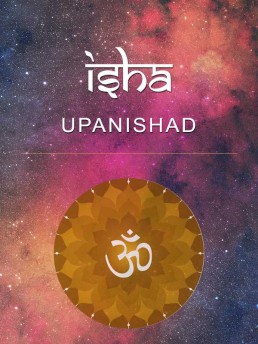अविद्यया मृत्युं तीर्त्वा विद्ययामृतमश्नुते ॥ ११ ॥
avidyayā mṛtyuṃ tīrtvā vidyayāmṛtamaśnute || 11 ||
विद्याम् (vidyām) – vidyā
च (ca) – and
अविद्याम् (avidyām) – avidyā
च (ca) – and
यः (yaḥ) – who
तत् (tat) – that
वेद (veda) – known
उभयग्म् (ubhayagm) – both
सह (saha) – together
अविद्यया (avidyayā) – by avidyā
मृत्युम् (mṛtyum) – death
तीर्त्वा (tīrtvā) – crossing
विद्यया (vidyayā) – by vidyā
अमृतम् (amṛtam) – immortality
अश्नुते (aśnute) – enjoys, obtains
Isha Upanishad Home
Isha – Sri Shankara’s Introduction
Isha – Invocation
Isha – 1-īśāvāsyamidaṃ sarvaṃ
Isha – 2-kurvanneveha karmāṇi
Isha – 3-asuryā nāma te lokā
Isha – 4-anejadekaṃ manaso
Isha – 5-tadejati tannaijati
Isha – 6-yastu sarvāṇi
Isha – 7-yasminsarvāṇi bhūtāny
Isha – 8-sa paryagāc chukram
Isha – 9-andhantamaḥ praviśanti
Isha – 10-anyad evāhur vidyayā
Isha – 11-vidyāṁ cāvidyāṁ ca
Isha – 12-andhaṁ tamaḥ praviśanti
Isha – 13-anyad evahūḥ
Isha – 14-sambhūtiṁ ca vināśaṁ
Isha – 15-hiraṇmayena pātreṇa
Isha – 16-pūṣann ekarṣe yama
Isha – 17-vāyur anilam amṛtam
Isha – 18-agne naya supathā

Commentary by Swami Sivananda
Mrityu or death means work and worldly knowledge. Tirtva means having go over. Asnute means attains. To have communication with the deities is Amritam or immortality.
Ishavasya Upanishad – Verse 11 – Isha – 11-vidyāṁ cāvidyāṁ ca – In Sanskrit with English Transliteration, Meaning and Commentary by Adi Shankaracharya (Sankara Bhashya) and Swami Sivananda – Ishavasya-11

Commentary by Sri Adi Sankaracharya – Translated in English
This being so, the following results. Vidya is the knowledge of the deities; Avidya is Karma. Who knows that both these should simultaneously be followed by the same person, he alone, so combining the two, gradually secures the one desirable end. ‘By Vidya’ means ‘by Karma such as Agnihotra, etc.’ ‘Death’ means ‘action and knowledge induced by Prakriti (nature).’ ‘Tirtva’ means ‘having got over.’ ‘By Avidya’ means ‘by the knowledge of the deities.’ ‘Asnute’ means ‘attains.’ To become one with the deities is what is called immortality (Amritam.)